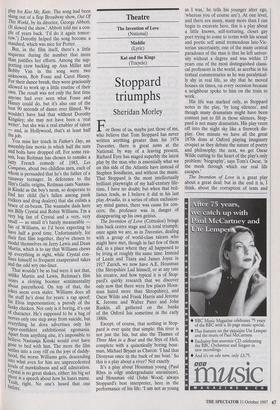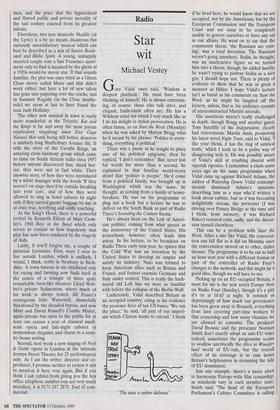Theatre
The Invention of Love (National)
Maddie (Lyric) Kat and the Kings (Tricycle)
Stoppard triumphs
Sheridan Morley
For those of us, maybe just those of me, who believe that Tom Stoppard has never written anything greater than his 1974 Travesties, there is great news at the National; by way of a leaving present, Richard Eyre has staged superbly the latest play by the man who is essentially what we on this side of the Atlantic have instead of Stephen Sondheim, and without the music. That Stoppard is the most intellectually brilliant playwright of my half-century life- time, I have no doubt; but when that bril- liance leads, as I believe it did in his last play Arcadia, to a series of often exclusion- ary mind games, there was cause for con- cern; the professor was in danger of disappearing up his own genius. The Invention of Love (Cottesloe) brings him back centre stage and in total triumph; once again we are, as in Travesties, dealing with a group of world-class talents who might have met, though in fact few of them did, in a place where they all happened to be living at roughly the same time. Instead of Lenin and Tzara and James Joyce in 1917 Zurich, we now have A.E. Housman (the Shropshire Lad himself, or at any rate his creator, and how typical it is of Stop- pard's quirky research that we discover only now that there were few places Hous- man hated more than Shropshire), and Oscar Wilde and Frank Harris and Jerome K. Jerome and Walter Pater and John Ruskin, all gathered on the banks of the Oxford Isis sometime in the early 1880s.
Except, of course, that nothing in Stop- pard is ever quite that simple; this river is not just the Isis, but also the Thames of Three Men in a Boat and the Styx of Hell, complete with a quixotically boring boat- man, Michael Bryant as Charon: 'I had that Dionysus once in the back of me boat.' So this is a play about a river? Not exactly.
It's a play about Housman young (Paul Rhys in edgy undergraduate uneasiness), and Housman old (John Wood, always Stoppard's best interpreter, here in the performance of his life: 'I am not as young as I was,' he tells his younger alter ego, 'whereas you of course are'). At one level, and there are many, many more than I can begin to excavate here, this is a play about a little known, self-torturing, closet gay poet trying to come to terms with his sexual and poetic self amid tremendous late-Vic- torian uncertainty; one of the many central paradoxes of the man is that he left univer- sity without a degree and was within 15 years one of the most distinguished classi- cal professors in the world, as acerbic in his textual commentaries as he was paralytical- ly shy in real life, so shy that he moved houses six times, on every occasion because a neighbour spoke to him on the train to work.
His life was marked only, as Stoppard notes in the play, 'by long silences', and though many dramatists might have been content just to fill in those silences, Stop- pard is not many dramatists. His play veers off into the night sky like a firework dis- play. One minute we have all the great 1870s dons at Oxford playing imaginary croquet as they debate the nature of poetry and philosophy; the next, we get Oscar Wilde cutting to the heart of the play's only problem: 'biography', says Tom's Oscar, 'is the mesh through which our real life escapes.'
The Invention of Love is a great play about a great deal; but in the end it is, I think, about the corruption of texts and men, and the price that the hypocritical and flawed public and private morality of the last century exacted from its greatest talents.
Elsewhere, two new musicals: Maddie (at the Lyric) is a by no means disastrous but curiously unsatisfactory musical which can best be described as a mix of Sunset Boule- vard and Blithe Spirit. A young, unhappily married couple rent a San Francisco apart- ment only to find it haunted by the ghost of a 1920s would-be movie star. If that sounds familiar, the plot was once tried as a Glenn Close movie called Maxie and that didn't work either; but here a lot of new talent has gone into papering over the cracks, and in Summer Rognlie (in the Close double- role) we seem at last to have found the next Judy Holliday.
The other new musical in town is vastly more wonderful: at the Tricycle, Kat and the Kings is far and away the most joyous celebratory singalong since Five Guys Named Moe and, being still better, deserves a similarly long Shaftesbury Avenue life. It tells the story of the CavaIla Kings, an amazing close-harmony group which came to fame on South African radio circa 1957 before anyone discovered that, shock hor- ror, they were not in fact white. Their showbiz story, of how they were introduced by a white manager with the words 'If they weren't on stage they'd be outside breaking into your cars', and of how they were allowed to sing in hotel cabaret by night only if they carried guests' baggage by day, is at once true, terrifying and oddly touching.
At the King's Head, there is a powerful revival by Kenneth Elliott of Mart Crow- ley's 1968 Boys in the Band which only serves to remind us how hopelessly that play has now been outdated by the tragedy of Aids.
Lastly, if you'll forgive me, a couple of personal footnotes. First, were I ever to live outside London, which is unlikely, I would, I think, settle in Newbury in Berk- shire. A town famous in my childhood only for racing and farming now finds itself at the centre of a triangle of three quite remarkable barn-like theatres: Lloyd Web- ber's private Sydmonton, where much of his work is always tested, Jill Fraser's courageous little Watermill, shamefully threatened by the dreaded bypass, and now Mary and David Russell's Combe Manor, again private but open to the public for at least one season a year of classical small- scale opera and late-night cabaret of tremendous elegance and charm in a coun- try-house setting.
Second, next week a new staging of Noel & Gertie opens in London at the intimate Jermyn Street Theatre for 25 performances only. As I am the writer, director and co- producer, I promise neither to review it nor to mention it here ever again. But if you think I can refrain from giving you the box office telephone number you are very much mistaken; it is 0171-287 2875. End of com- mercial.



















































































 Previous page
Previous page